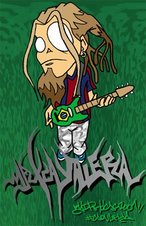
In a recent issue of the on-line magazine "Communalism", Janet Biehl refers to some interesting aspects of the life and work of the philosopher of Social Ecology, Murray Bookchin, which support our comments on the decline of the counterculture at the end of the sixies, as well as the emergence of the ecological movement.
Biehl writes that
his 1969 essay “Listen, Marxist!” represented, not simply a warning to the SDS to avoid a takeover by Maoists of the Progressive Labor Party, but also his definitive personal break with Marxism as the ideology by which he defined himself. He took pride when, a few years later, Victor Ferkiss identified him with a tendency that he called “eco-anarchist.”
(...)
Murray went on in the 1970s to make further contributions to both eco-anarchism and to anarchism as such. He pioneered exploration of alternative energy sources and eco-technics in his 1965 essay “Towards a Liberatory Technology.” In the 1970s he developed a distinction between ecology (inherently radical) and environmentalism (reformist).
(...)
In 1969 Students for a Democratic Society (SDS), the primary political organization of the American New Left, collapsed, its leadership having been taken over by ultraleft guerrilla groups like Weatherman and the Black Panthers. The Maoist guerrilla campaigns that had seemed to be the path ahead ended up destroying the organization. The student movement had always suffered from the endemic problem of fast turnover—no sooner do students organize a demonstration than summer vacation begins; no sooner do students develop political experience than they graduate. In April 1970 National Guards killed four student demonstrators at Kent State in Ohio. Among the New Left’s rank and file the National Mobilization Committee to End the War in Vietnam continued to pull together intermittent demonstrations in Washington. The 1972 presidential campaign of George McGovern channeled the energy of many antiwar activists. Amid the once-vibrant American radical movement confusion reigned.
In these years Murray was involved with the East Side Anarchists in New York as well as a libertarian collective that published the periodical Anarchos. What the American radical movement needed, he realized, in order to function as a real social and political alternative, was a set of institutions that would have at least some permanence. But no such institutions remained from the detritus of SDS or emerged from the antiwar demonstrations. Marches were “ephemeral spectacles,” he wrote in “Spring Offensives and Summer Vacations,” published in Anarchos in June 1972. “After each demonstration, street action, or confrontation, this hollow cone [of organizational leadership] all but collapsed, only to be recreated again with varying degrees of success for another demonstration, street action, or confrontation.”
Something more lasting had to be built: “The hollow cone that we call a movement must acquire a more solid geometry. It must be filled in by an authentic popular movement based on the self-activity of the American people, not the theatrical eruptions of a dedicated minority.” Antiwar activists, he urged, should build stable institutions.
(...)
As we have seen, Murray had argued that revolutionary institutions are formed spontaneously by the people during the course of a revolution. (Spontaneity was one of his principles of convergence between anarchism and ecology.) But during the late 1970s—I believe it was about 1977 —something happened that permanently changed his thinking: he came to the realization that he was not going to see a revolution would happen in his lifetime. The way he put it to me was: he realized that the revolutionary era is over.
He had been working with the Clamshell Alliance, the group that prevented the Seabrook nuclear reactor from going on line. Was it something about that experience that led to this realization? He was frustrated by the decision-making processes used in that group: consensus, he found, was a process very prone to manipulation. Or was it the changes happening in North America and Europe in the 1970s? Certainly the United States was entering a period of right-wing backlash against the 1960s (a backlash that continues to this day). Onetime radicals were now pursuing careers, getting “a piece of the pie” for themselves. The new social movements were emerging, which offered hope but also fragmentation of any broad movement; they moved radical thinking increasingly toward identity politics. Ecology was emerging as an issue of general concern, but as Washington adopted a few environment-friendly laws, radical ecologists were becoming reformist environmentalists. Finally the alternative (non-Western and noncredal) spiritualities that made up the New Age were ever more popular, luring former political activists into private life and promising to replace extroverted demands to change society with inner quests for serenity and enlightenment.
We stop here with the quotes of this interesting article, since they suffice to complement the elements that sketch the political atmosphere of the end of the sixties and most of the seventies which gave inspiration for many rock songs of that era. What we want to add is that Bookchin's writings and lectures of that era influenced to a substantial degree several ecological initiatives and many more individuals that started to flirt with this new emerging movement. Some of those individuals took part in the formation processes of the new Green Parties and gave them radical inclinations. The majority, however, remained outside partisan processes, trying to realize communalist projects and initiatives, and familiarize wider audiences with Bookchin's Social Ecology. For more information we direct you to web pages that are devoted on these lines:
Institute of Social Ecology
Communalism
Left Green Perspectives
Murray Bookchin Archive
Janet Biehl's blog with graphics about Bookchin
Democratic Alternative
Social Ecology London
European Social Ecology Institute




No comments:
Post a Comment